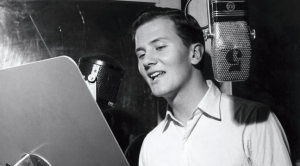
Elvis Presley’s rendition of “Hound Dog” stands as a cornerstone in the annals of rock and roll, a song that not only showcased the King’s unparalleled charisma and vocal prowess but also redefined the boundaries of popular music. Originally penned by Jerry Leiber and Mike Stoller, the song had found success in the hands of Big Mama Thornton, a rhythm and blues vocalist. However, it was Presley’s electrifying interpretation that catapulted the song to unprecedented heights, making it an enduring anthem of rebellion and youthful energy.
Background
Released in 1956, “Hound Dog” arrived at a pivotal moment in Presley’s career. The young singer from Memphis had already stirred controversy and captivated audiences with his groundbreaking blend of rockabilly, country, and rhythm and blues. Yet, “Hound Dog” represented a quantum leap forward, a song that perfectly encapsulated the raw, sexual energy and defiant spirit of the era.
Presley’s version of “Hound Dog” is a masterclass in performance. His voice, imbued with a potent mix of vulnerability and bravado, cuts through the music with a raw intensity that is both thrilling and intoxicating. The song’s lyrics, a scathing indictment of a lazy and unreliable lover, are delivered with a biting sarcasm that is utterly compelling. Presley’s ability to transform a character into a fully realized persona is evident in every word, every note.
Beyond the vocal performance, the arrangement of “Hound Dog” is equally impressive. The driving rhythm section, featuring the iconic slap bass of Bill Black, provides a relentless pulse that propels the song forward with irresistible force. The restrained piano solo, delivered with understated brilliance by Glen D. Hardin, adds a touch of sophistication to the raw energy of the track. And, of course, there is Presley’s iconic hip-swiveling dance moves, which added a visual dimension to the song that was as groundbreaking as the music itself.
The impact of “Hound Dog” cannot be overstated. It was a massive commercial success, topping the charts and becoming one of Presley’s signature songs. But its significance extends far beyond sales figures. The song helped to bridge the gap between white and Black audiences, exposing a wider audience to the raw power and vitality of rhythm and blues. It also served as a catalyst for the burgeoning rock and roll movement, inspiring countless young musicians to pick up their guitars and create their own brand of rebellious music.
In the decades since its release, “Hound Dog” has become an enduring classic, a song that continues to resonate with audiences of all ages. Its timeless appeal lies in its ability to capture the essence of youth, rebellion, and the human desire for freedom. Presley’s performance is a testament to his extraordinary talent and his enduring legacy as the King of Rock and Roll.
Additional Information
- Songwriting Credits: Jerry Leiber and Mike Stoller, renowned songwriters who penned numerous hits for artists such as Elvis Presley, Little Richard, and The Coasters.
- Original Recording: Big Mama Thornton’s version of “Hound Dog” was released in 1952 and was a hit on the rhythm and blues charts.
- Chart Success: Presley’s version of “Hound Dog” topped the Billboard pop and R&B charts in 1956.
- Cultural Impact: The song’s provocative lyrics and Presley’s sexually suggestive performance contributed to the controversy surrounding rock and roll in the 1950s.
- Legacy: “Hound Dog” remains one of the most popular and enduring rock and roll songs of all time, and it has been covered by countless artists.